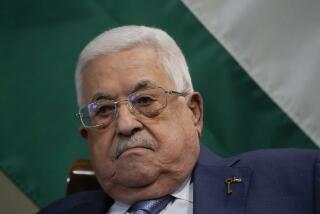PAKISTAN / THE OLD GUARD RETURNS : Spurned by Bhutto, He Gets Even
- Share via
LONDON — He was one of the “uncles,” a key party elder who served for decades as adviser, alter ego and personal confidant of Benazir Bhutto’s father, Zulfikar Ali Bhutto.
He stood beside the elder Bhutto whether in power or in prison, holding six separate Cabinet posts during Zulfikar’s seven years of rule, then spending a year in solitary confinement after the 1977 military coup that drove the elder Bhutto from power.
More than anything else, Ghulam Mustafa Jatoi was Old Guard, patriarch of a political family even older than the Bhuttos. And when the young and charismatic Bhutto daughter returned to Pakistan in 1986 from exile, promising to lead the nation from the darkness of martial law into a new dawn of democracy, Jatoi, it appeared, had outlived his usefulness.
The split was a public one, irreparable. And, in many ways, it sowed the seeds of Benazir’s recent fall from power. For now, Bhutto is out and Jatoi is Pakistan’s new prime minister.
If it all sounds a bit feudal, such is the nature of Pakistani politics. The falling out between the younger Bhutto and her father’s former lieutenant, a personal rejection that forced Jatoi out of Bhutto’s Pakistan People’s Party and into the opposition camp four years ago, helps explain the sudden change at the top in Pakistan earlier this month, when President Ghulam Ishaq Khan fired Bhutto, accusing her of rampant corruption, nepotism and mismanagement and appointed Jatoi as caretaker in her place.
But it also helps define the character of Pakistan’s new leader, the 59-year-old, Westernized political veteran who will chart the course of one of America’s closest Third World allies, at least until new elections are held Oct. 24.
“The biggest change is really one of style,” said Kamal Azfar, Jatoi’s closest personal adviser and now a member of his Cabinet. “The entire politics of internal confrontation has been replaced by a politics of consensus. This is Mr. Jatoi’s style, and his goal is to gradually rebuild confidence in institutions rather than individuals.”
The key word there, according to veteran Pakistani political analysts, is “gradual.” Jatoi’s politics are a vintage strain of old-world deliberation and almost-tribal consultation. When his differences with Bhutto in 1986 forced him to break ranks and form the rival National People’s Party, for example, he resisted the temptation to take quick revenge, preferring to plod through the years of political confrontation and, as one of his supporters said, “allow Benazir time to self-destruct.”
Similarly, in the weeks since he was hastily sworn in, Jatoi has pledged several times that “there will be no witch-hunt,” although Bhutto and her supporters remain convinced that the purpose of the corruption courts he has established is to charge, try and convict members of the Bhutto clan in time to bar them from contesting the elections.
Advisers say Jatoi is working hard to bring together all of the rightist forces who opposed Bhutto in the last elections in a united front that will permit him to keep his new job, a victory that would amount to a meteoric rise for a politician whose party won just one seat--his own--in 1988.
Critics strongly believe that Pakistan’s powerful armed forces were the true engineers of what Bhutto charges was “a constitutional coup d’etat.” They say that if Jatoi exceeds the bounds of permissible politics implicit in the order that brought him to power, the army will take power from him as well.
“That’s not true at all,” said his adviser, Azfar. “The army obviously has its own weight. The Pentagon certainly has its own weight as a lobbying force in America as well. But, in fact, what is now happening is we are consulting everyone in all institutions in an effort to rebuild those institutions.”
Perhaps most encouraging for Western interests in Pakistan, though, is Jatoi’s urbane and secular manner. In a region rife with Islamic fundamentalism, and in a nation founded as an Islamic state with 98% of its population Muslims, Jatoi favors three-piece suits over Pakistan’s pajama-like shalwar-kameez national dress. He likes thick cigars, speaks English in perfect idiom, and hardly shares the disdain of Pakistan’s Islamic priests for alcohol, which has been legally banned in Pakistan since 1977.
“He clearly is not a fundamentalist,” Azfar said. “He is a modern man.”
More to Read
Sign up for Essential California
The most important California stories and recommendations in your inbox every morning.
You may occasionally receive promotional content from the Los Angeles Times.













